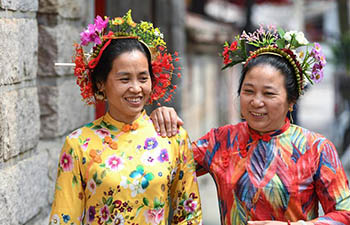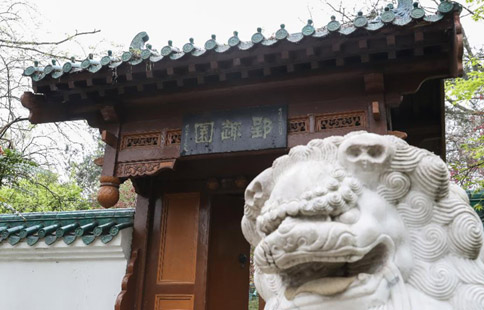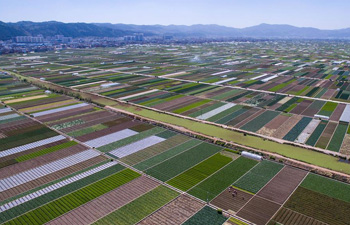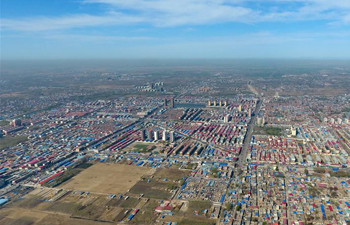LHASA, April 10 (Xinhua) -- Kelsang Jampa never imagined that one day he would have a new house in a neat courtyard, as his family was one of the most poverty-stricken households in Dagdong village of southwest China's Tibet Autonomous Region.
Jampa moved into his new two-story house just before the Tibetan new year, which fell on Feb. 27 this year. It was built on the site of his old home.
On the hillside in front of his house are the ruins of the sixth Dalai Lama Tsangyang Gyatso's manor. Dagdong village, a traditional farming village, was once famed in a love poem by Tsangyang Gyatso, also a famous poet. In the poem, Tsangyang Gyatso mentions the hill where his manor was located.
Dagdong village has a population of 800, 180 of which are registered as impoverished. A year ago, Jampa and his five family members were still living on an annual social security grant of 6,000 yuan (869.6 U.S. dollars).
However, benefiting from China's poverty-alleviation campaign, Dagdong village has started to change.
In Jampa's eyes, the village had not changed much for decades until April 2016, when a tourism company was jointly founded by the village and two local companies, with support from the Niu township government to help the village get rid of poverty.
New roads have been built, walls repainted and resort hotels and campsites built in the village.
Along with the improved infrastructure, an increasing number of tourists from across the world have rushed to visit the ancient village.
Tourists camp in front of the ruins of Tsangyang Gyatso's manor, tour the 900-year-old peach tree and visit ancient temples in the village.
Since Tibetans prefer not to migrate to work, young villagers view the booming tourism in Dagdong as a good opportunity for them to make money in their hometown.
Jampa's new house was part of a tourism project in the village. Meanwhile, the new work has provided a good job for his son -- transporting construction materials.
"My son will take his driving test soon. With a driving license, he can earn money via transportation. I will rent a room of my new house to a yogurt processing mill, which will bring me a monthly rent of 2,000 yuan," Jampa said.
This year, the annual income of his family is expected to surpass 40,000 yuan.
"My name will eventually be included on the name list of households casting off poverty," Jampa said.
Another villager, 70-year-old Chonyi Dechen, said she never imagined her son would find a job in a local orchard.
Tourism has created jobs such as cleaners, security guards and waiters for villagers.
Statistics from the regional tourism development commission show that the region's investment in tourism and tourism-related poverty alleviation projects totaled more than 600 million yuan in 2016, bringing benefits to over 40,000 impoverished people in the region.
The regional government hopes that by the end of 2020, all farmers and herdsmen engaged in tourism will be able to earn an average annual income of 16,000 yuan.
"This year, we will spend 90 million yuan to build a hotel and a hot spring resort," said Tobgye, head of the township.
Dagdong village is estimated to receive a total of 150,000 tourists this year, creating an income of 40,000 to 60,000 yuan to each family.
"Villagers find hope in the tourist industry. We are not far from the day when we can completely get rid of poverty," Tobgye said.
One month ago, dozens of hectares of peach trees were planted by the ruins of Tsangyang Gyatso's manor in Dagdong village with financial support from the Niu township government.
The village will hold its first peach flower festival in May.

















